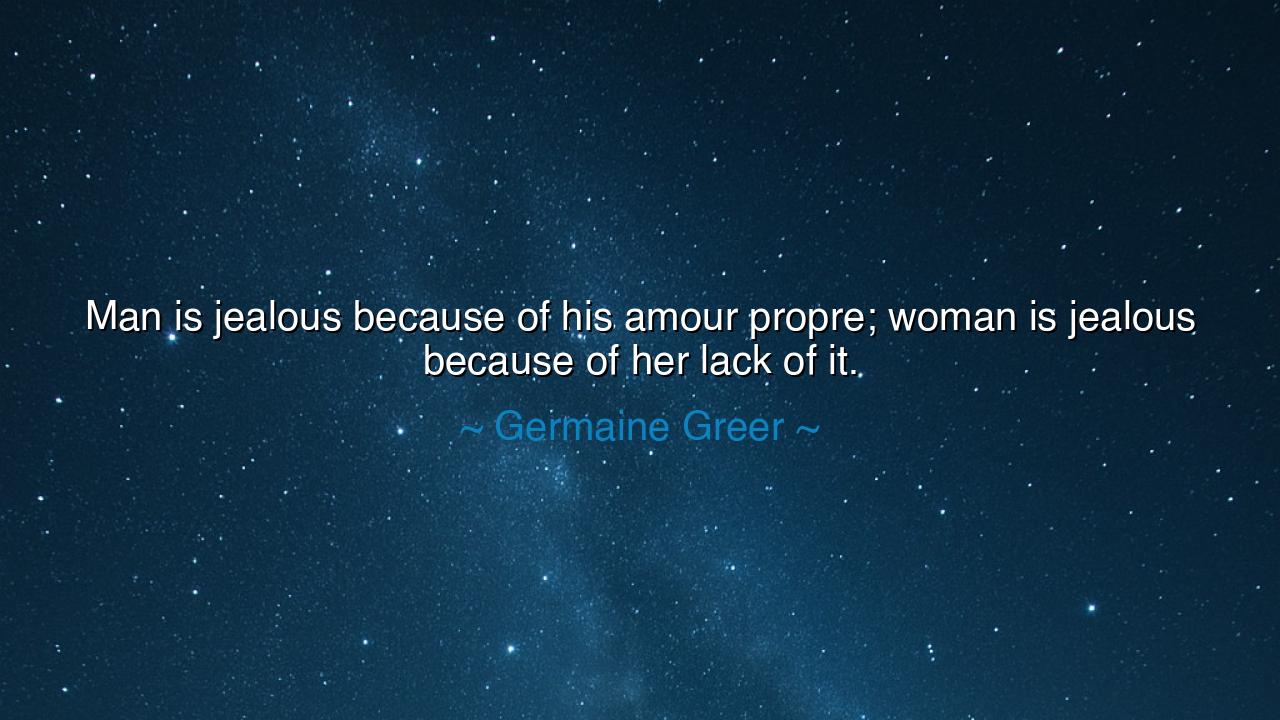
Man is jealous because of his amour propre; woman is jealous
Man is jealous because of his amour propre; woman is jealous because of her lack of it.






“Man is jealous because of his amour propre; woman is jealous because of her lack of it.” Thus spoke Germaine Greer, the fierce and fearless scholar of womanhood, whose words burn with both intellect and rebellion. In this single line, she reveals a double truth about jealousy, pride, and the delicate balance of power between the sexes. For amour propre, that French phrase meaning “self-love” or “self-respect,” lies at the root of her insight. The man, she says, becomes jealous because his pride — his sense of identity — is threatened when his beloved’s attention strays. The woman, on the other hand, is jealous because her sense of self has been made to depend upon that love. One guards his ego; the other fears her emptiness. And thus, both become prisoners of the same chain, though for different reasons.
Greer, writing in the age of feminist awakening, sought to unmask the hidden structures of power that shaped emotion itself. She saw that the emotions men and women experience are not merely personal, but historical — born from centuries of expectation and inequality. The man’s amour propre, his self-love, has been cultivated since birth; he is told that his worth lies within himself, in his strength, his reason, his mastery. The woman, by contrast, is told that her worth lies without — in the eyes of others, in beauty, in approval, in the love she can secure. And so, when love falters, the man’s pride is wounded — while the woman’s very identity collapses. Both suffer, yet the roots of their suffering grow in different soils.
The ancients, too, understood this division of pride and dependency, though they cloaked it in myth. Consider the tale of Hera and Zeus. Zeus, the mighty ruler of Olympus, was jealous not because he lacked confidence, but because his amour propre could not bear the thought of being defied or matched. His jealousy was a wound to pride. Hera, his queen, was jealous not of his power but of his love — for she had built her identity upon being his chosen, his counterpart. She raged against his infidelities not because she desired conquest, but because, without his faithfulness, her place — her self — seemed to vanish. In them, Greer’s insight is made divine allegory: the man’s jealousy is an insult to his pride, the woman’s jealousy a cry of wounded dependence.
Yet Greer’s meaning is not to condemn either, but to reveal how both are trapped by the same misunderstanding — that love is possession, that selfhood depends upon another. The man’s amour propre makes him believe that his partner’s freedom diminishes his own power. The woman’s lack of it makes her believe that her partner’s departure diminishes her worth. Both mistakes arise from the same illusion — that love and self-respect are bound together, when in truth they must be separate if either is to flourish. To love another fully, one must first stand whole within oneself. Without that inner strength, jealousy grows like a weed, feeding on insecurity and fear.
Germaine Greer, in her fearless honesty, sought not to romanticize jealousy but to disarm it. She saw it as a sickness born from imbalance — the man’s excess of pride, the woman’s scarcity of it. The cure, she implied, is not in suppressing emotion, but in transforming the roots from which it grows. The man must learn humility — to see love not as conquest, but communion. The woman must learn amour propre — to find her worth not in reflection, but in radiance. When both achieve this balance, love ceases to be ownership and becomes partnership. Jealousy fades, for there is nothing left to defend, and nothing left to lose.
History offers glimpses of what happens when this balance is found. Eleanor of Aquitaine, queen of two kingdoms, loved boldly and ruled fiercely. Her pride was her own, not borrowed from any man, and her love — even when tested — never reduced her to dependence. She proved that amour propre need not be arrogance, but dignity; not a wall against others, but a foundation beneath oneself. In her, Greer’s ideal was made flesh: a woman who could love without surrendering her self, and command respect without needing possession.
So, my listener, take this wisdom and weigh it in your heart. When jealousy stirs within you, ask yourself — is it pride or emptiness that speaks? If it is pride, learn gentleness; if it is emptiness, learn self-love. For love cannot heal what pride inflames, nor can it fill what the self refuses to honor. The greatest gift you can give to another is not your dependence, but your wholeness; not your submission, but your freedom. For only when two complete souls meet does love become creation, not captivity.
Thus, remember Germaine Greer’s truth: Man is jealous because of his amour propre; woman because of her lack of it. Let us end both forms of bondage — let men find humility, and women discover pride. For only then will love rise unshadowed by jealousy, and two hearts, standing equal and whole, will know what it truly means to be free.






AAdministratorAdministrator
Welcome, honored guests. Please leave a comment, we will respond soon